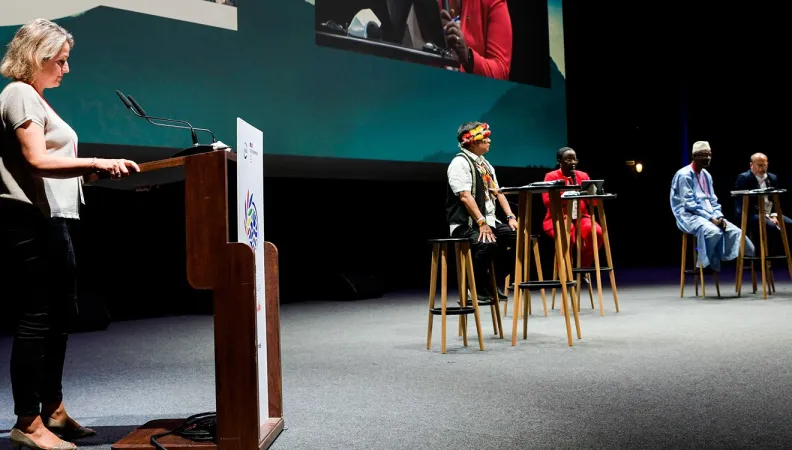Share the page
One Planet Summit: Eight Months on, Progress on Biodiversity
Published on

Agence française de développement is taking very concrete action to implement a series of initiatives stemming from the One Planet Summit in January 2021 and focused on biodiversity. A progress report took place at the IUCN World Conservation Congress, held in Marseilles from 3 to 11 September.
“Together, we have helped raise the level of ambition of the international community in the face of biodiversity loss”. On Monday 6 September at the IUCN World Conservation Congress, Barbara Pompili, Minister for Ecological Transition, chaired the first progress report on the commitments made for biodiversity at the One Planet Summit in January 2021.
Further reading: France and AFD, Key Partners of IUCN
Where are we, eight months on? As Agence française de développement (AFD) pursues its objectives of doubling its financing for biodiversity by 2025 - from 565 million euros to 1 billion euros - and reaching 30 % of climate financing that also benefits nature by the same date, below are five initiatives for which the group is taking very concrete action.
The Kiwa initiative for resilience in the Pacific
Launched in 2020 by the European Union, France, Canada, Australia and New Zealand, the Kiwa initiative finances the deployment of nature-based solutions for biodiversity and climate change adaptation in vulnerable Pacific Island States, which include invasive species control, the restoration of forest ecosystems and organic farming.
With a 41 million euros budget, it is managed by AFD in conjunction with the international organizations in the Pacific region. Some 22 million euros have already been committed to support the creation of a network of agroecological farms that disseminate knowledge and develop short-circuit economic opportunities for farmers in Nauru, Fiji, Tonga and the Solomon Islands.
The LDN (Land Degradation Neutrality) fund
Financing nature conservation is a major challenge. Among the many initiatives mixed public-private finance initiatives supported by the One Planet Summit, the LDN Fund has raised more than $200 million to finance agricultural and forestry projects on degraded lands in emerging countries.
For example, it has helped create a profitable hazelnut tree industry in Bhutan in line with the Himalayan state's ambitious forest protection policy. The fund is now part of the more ambitious Alliance for the Preservation of Natural Capital, which aims to raise $10 billion for nature by 2022.
The Prezode project
The pandemic has highlighted more than ever the intrinsic link between ecosystem health, animal health and human health. Based on the "One Health" concept, the Prezode (Preventing Zoonotic Diseases Emergence) project arose from the commitments of the One Planet Summit.
It aims to prevent the risk of epidemics emerging by supporting research on the links between animal, environmental and human health, thereby placing biodiversity at the heart of prevention issues. “Prezode is currently bringing together thousands of researchers from 50 countries", said AFD’s CEO, Rémy Rioux, at the IUCN World Conservation Congress.
Taskforce on Nature-related Financial Disclosure (TNFD)
To focus financial flows on nature-friendly investments and activities, AFD has actively participated in the emergence of the Taskforce on Nature-related Financial Disclosure (TNFD). It brings together companies and financial institutions to enable them to better assess the impacts of their investments on biodiversity and the resulting risks.
Further reading: One Planet Summit: AFD undertakes to allocate at least 30% of its climate funding to biodiversity
“Its work is absolutely essential, just as this type of effort has been for the climate", observes Gilles Kleitz, Director of the Ecological Transition Department at AFD. Since its creation, the TNFD has received a great deal of interest from many stakeholders, some of whom are important players in international finance.
The Great Green Wall Accelerator
Early in 2021 France became involved in the implementation of the "Great Green Wall Accelerator", an international initiative that aims to breathe new life into this pharaonic project whose objective is to restore 100 million hectares of degraded land over an 8,000 kilometre long strip stretching from Senegal to Djibouti by 2030.
In January, the various partners, including AFD, pledged to mobilize €14 billion of additional financing before 2025. This objective has already been exceeded as €16 billion have been obtained.
“This is a very good start but it is not enough. The Sahel needs 4 billion dollars (3.4 billion euros) per year from now to 2030 to reach the goals we have set", said Ibrahim Thiaw, Executive Secretary of the UN Convention to Combat Desertification.
Menu latéral
$(document).ready(function() {
$('#most_viewed_nodes_block').replaceWith($('#mi'));
});
IUCN Series
3 Questions on the IUCN World Conservation Congress Lessons learned from the IUCN World Conservation Congress The IUCN World Conservation Congress in 8 Points France and AFD, Key Partners of IUCN How Public Development Banks can Support Biodiversity Costa Rica and France's Southeast: A Partnership for Biodiversity at the World Conservation Congress Main Menu
